January 2024, Volume 35, Issue 1
Portrait of an iPhone Statesman
A review of The Showman: Inside the Invasion That Shook the World and Made a Leader of Volodymyr Zelensky, by Simon Shuster.
January 2024, Volume 35, Issue 1
A review of The Showman: Inside the Invasion That Shook the World and Made a Leader of Volodymyr Zelensky, by Simon Shuster.
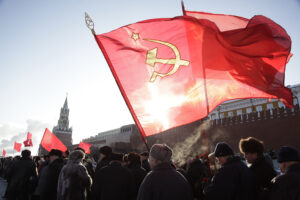

July 2023, Volume 34, Issue 3
People obsess over where Russia’s democracy went wrong. The truth is it did not fail: Russia’s democratic transition never got off the starting blocks.
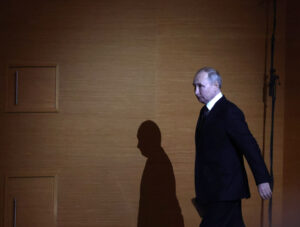

April 2023, Volume 34, Issue 2
Vladimir Putin’s reputation as a skillful leader was buoyed by years of economic good fortune. But when his regime faltered, his rule quickly descended into the fearful, repressive, and paranoid state we see today.
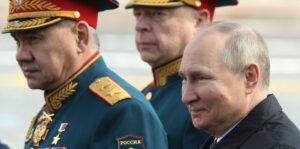

January 2023, Volume 34, Issue 1
When Vladimir Putin launched a massive invasion of Ukraine, he expected an easy victory. Instead, the world has witnessed an object lesson in how a corrupt Russian regime crippled its own military power.
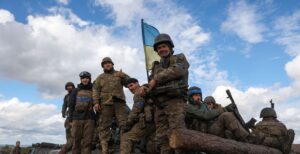
October 2022, Volume 33, Issue 4
Will Russia’s war tip the Kremlin even further toward tyranny while fortifying Ukraine’s democracy? That will depend on Vladimir Putin and Volodymyr Zelensky as much as on the course of the war itself.
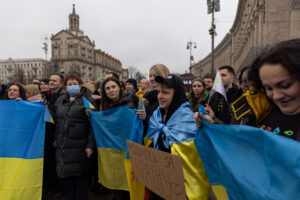
October 2022, Volume 33, Issue 4
The share of Ukrainians who endorse democracy as the best form of government has risen fast in short order, standing now at more than three-quarters. New data reveal a surprising explanation behind this remarkable shift.
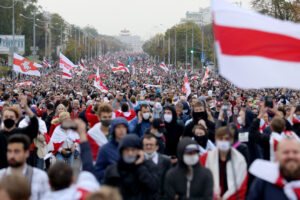

October 2022, Volume 33, Issue 4
Opposition movements often boycott rigged polls rather than risk legitimizing an autocrat. It is usually a mistake. Here is the playbook for how one opposition seized the advantage.
July 2022, Volume 33, Issue 3
The more determined democracies are to avoid war, the greater the risk that autocracies will wage it.
July 2022, Volume 33, Issue 3
Why did Russia invade Ukraine? And why are Russian forces fighting so poorly? The internal logic of its personalist dictatorship is to blame.
July 2022, Volume 33, Issue 3
More than window dressing, public-opinion surveys and elections provide a crucial insight into the Russian people’s relationship with their regime.
July 2022, Volume 33, Issue 3
The first two months of the war alone turned the Russian clock back decades, undoing thirty years of post-Soviet economic gains and reducing the country to an international pariah state.


July 2022, Volume 33, Issue 3
The Kremlin wields food as a weapon and a shield against Western interference. But Putin’s push for food autarky could backfire, driving up prices and turning Russians against the regime.
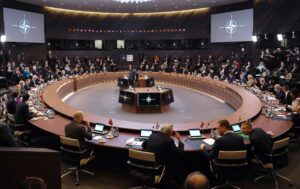

April 2022, Volume 33, Issue 2
Vladimir Putin’s invasion of Ukraine has done something for the world’s democrats they could seemingly not do for themselves—given them renewed unity, purpose, and resolve.
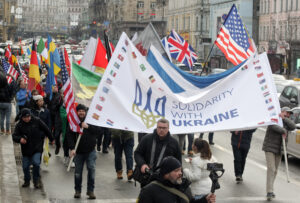

April 2022, Volume 33, Issue 2
Forget his excuses. Russia’s autocrat doesn’t worry about NATO. What terrifies him is the prospect of a flourishing Ukrainian democracy.
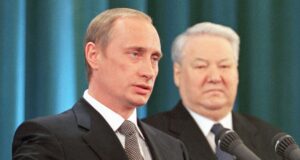

October 2021, Volume 32, Issue 4
Thirty years after the Soviet Union collapsed, Russia is firmly in the grip of an autocrat. Where did Russia’s path go wrong?

July 2021, Volume 32, Issue 3
Is Russia formidable? The answer, two new books argue, lies in the highly centralized inner workings of Putin’s autocracy.
July 2020, Volume 31, Issue 3
The illiberal credo prominent in Russia’s foreign policy is more than just a clever political ploy. Rather, this outlook reflects the traumatic experience of the 1990s, and it is stoked by young political thinkers, the Russian Orthodox Church, and the Kremlin itself.
January 2020, Volume 31, Issue 1
Lacking any ideas for shoring up Russian society, Putin has settled on picking a fight with Ukraine.

April 2019, Volume 30, Issue 2
In 2018, a peaceful protest movement brought down Armenia’s semiauthoritarian government and ushered in a new political era, the culmination of a long struggle for national pride, self-determination, and democracy.
January 2018, Volume 29, Issue 1
Russia’s ruling elite have used corruption not only to line their own pockets, but also as a tool of domestic political control and global power projection.

October 2017, Volume 28, Issue 4
Under Vladimir Putin, Russia’s ruling class again claims to represent a superior alternative to liberal democracy. How can we theorize this regime? Putinism is a form of autocracy that is conservative, populist, and personalistic. Its conservatism means that Putinism prioritizes maintaining the status quo and avoiding instability. Conservatism also overlaps with Putinism’s populism in crowd-pleasing broadsides against gay rights and feminism, but gives…
October 2017, Volume 28, Issue 4
Read the full essay here. “The pursuit of national glory,” which M. Steven Fish counts among the features of Vladimir Putin’s “populism,” is emerging as central to the regime’s legitimation. Unlike previous instances of patriotic mobilization (around the Second Chechen War and the 2008 Georgia war), the current one appears to have evolved into a…
October 2017, Volume 28, Issue 4
Read the full essay here. This essay argues that the sources of the current revival of Russian authoritarianism lie in the country’s economic and political history. Among the major factors behind President Putin’s rise and consolidation of power, it cites an ideological overemphasis on the state that fosters hostility toward human rights and liberties; deeply…
October 2017, Volume 28, Issue 4
Read the full essay here. The Kremlin’s ability to maintain power and popularity despite an aging leader, an ailing economy, a rallying opposition, and many other domestic and international challenges is puzzling given current theories of authoritarianism. These theories focus on some combination of material interests, institutional engineering, and the charisma and skill of the…
October 2017, Volume 28, Issue 4
Read the full essay here. The Russian system of personalized power is growing ever more dependent on the same strategies that proved useless in sustaining the USSR. While the system still has the potential to limp along, its survival tactics render the it progressively more dysfunctional. Among the circumstances weighing against the system’s survival are…
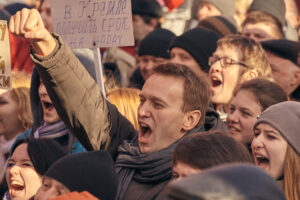

October 2017, Volume 28, Issue 4
More Russians are rejecting the Kremlin’s corruption and authoritarianism. They—and not the regime—are Russia’s future.
October 2017, Volume 28, Issue 4
A review of China’s Eurasian Century? Political and Strategic Implications of the Belt and Road Initiative by Nadège Rolland.
July 2017, Volume 28, Issue 3
Turkmenistan’s authoritarian president Gurbanguly Berdimuhammedov attempted to use sham democratic elections in February 2017 to bolster his legitimacy both at home and abroad.
July 2017, Volume 28, Issue 3
A review of Dictators Without Borders: Power and Money in Central Asia by Alexander Cooley and John Heathershaw.
January 2017, Volume 28, Issue 1
Today, there are three parts of the old Soviet bloc—one is democratic, another is wholly authoritarian, and a third “intermediate” group is caught between two worlds. This last should be the main focus of Western assistance.

July 2016, Volume 27, Issue 3
A quarter-century after the Soviet breakup, democracy has hardly fared well across the vast Eurasian landmass. Why has this seemingly promising gain for freedom produced such disappointing results?
January 2016, Volume 27, Issue 1
Much can be done to uproot graft when a major event such as the Rose Revolution sweeps in a determined new team on a wave of massive public support.
October 2015, Volume 26, Issue 4
The Kremlin is now bringing to the rest of the world the kind of propaganda and conspiracy theories it has been churning out at home.

July 2015, Volume 26, Issue 3
A few years ago, Europe’s most important intergovernmental human-rights institution, the Council of Europe, crossed over to the dark side. Like Dorian Gray, the dandy in Oscar Wilde’s story of moral decay, it sold its soul. And as with Dorian Gray, who retained his good looks, the inner decay of the Council of Europe remains hidden from view.
April 2015, Volume 26, Issue 2
A review of Putin’s Kleptocracy: Who Owns Russia? by Karen Dawisha.
January 2015, Volume 26, Issue 1
The system of personalized power that has long ruled Russia now faces a new crisis, and it is trying to avert decay through the reassertion of empire.
July 2014, Volume 25, Issue 3
Russia has witnessed a growing rapprochement between some of its nationalists and some of its democrats, but this trend is threatened by divisions over the annexation of Crimea.
January 2014, Volume 25, Issue 1
The changes that civil societies in Central and Eastern Europe have experienced since communism’s fall are real, but often misunderstood.
January 2014, Volume 25, Issue 1
A year after the election that ended the rule of president Mikheil Saakashvili’s National Movement, Georgia has seen further remarkable developments that raise key questions for struggling postcommunist democracies and, indeed, democracies everywhere.
July 2013, Volume 24, Issue 3
Today’s Russian protest movement in many ways resembles past civil-rights and civil-resistance efforts in other parts of the world, from its commitment to nonviolence to its key demands—a vote that counts and equality under the law. Listen to the podcast.
July 2013, Volume 24, Issue 3
The Putin regime, having faced its first real challenge in the form of mass protests after the 2011 Duma elections, is responding with a series of laws intended to intimidate its civil society opposition, if not stamp it out altogether.
January 2013, Volume 24, Issue 1
In October 2012, Georgia’s government lost power in an election, and peacefully stepped aside. But can a country with Georgia’s troubled history capitalize on this surprising achievement?

July 2012, Volume 23, Issue 3
A newly awakened Russia is now asking of series of questions, such as how to transform the current system and who will be the actors to lead the transformation.
July 2012, Volume 23, Issue 3
Although they have quieted down as quickly as they flared up, the clamorous protests that followed the dishonest Russian legislative elections in December 2011 have essentially destroyed Putin’s regime, the infamous “managed democracy.”
July 2012, Volume 23, Issue 3
One of the most striking and unexpected features of the recent demonstrations in Russia was the partnership of liberals and nationalists in the ranks of the protesters.
July 2011, Volume 22, Issue 3
Strongman Alyaksandr Lukashenka’s suspiciously lopsided 2010 electoral victory—and subsequent crackdown on dissent—may seem like a repeat of the events of 2006, but much has changed in the interval, and his regime is much more precarious today.
July 2011, Volume 22, Issue 3
Having thrown out a corrupt, authoritarian president for the second time, this Central Asian republic has gained a new chance at securing a real democratic transition.

April 2011, Volume 22, Issue 2
Why are the unfree regimes of the former Soviet world proving so durable? A lack of ideology and—perhaps surprisingly—a degree of openness are proving to be not so much problems for authoritarianism as bulwarks of it.
January 2011, Volume 22, Issue 1
A review of Lonely Power: Why Russia Has Failed to Become the West and the West Is Weary of Russia by Lilia Shevtsova.
January 2010, Volume 21, Issue 1
This is a central problem—perhaps the central problem—for classical liberal theory and its crucial distinction between the state of nature and the civil state. Which is better for liberty: nature or the state?
January 2010, Volume 21, Issue 1
The central problems now blocking democracy in Georgia and other parts of the former USSR are: 1) the use of power in order to gain wealth; 2) the absence of the rule of law; and 3) the passivity of citizens.
January 2010, Volume 21, Issue 1
The author analyses the confluence of several elements that helped to set Russia’s course: the influence of history; the challenges of the transformation process itself; the importance of leadership; and the role of the West.
July 2009, Volume 20, Issue 3
Since 1996, eight postcommunist authoritarian rulers have been ousted by “electoral revolutions.” Why have these not succeeded in other postcommunist countries?
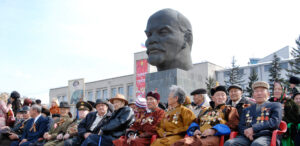
April 2009, Volume 20, Issue 2
There is no consensus about the nature of the political system in Moscow today. Yet how one understands the motivations propelling Russian policy abroad depends on how one understands its regime at home.
April 2009, Volume 20, Issue 2
A fan of Mario Puzo’s Godfather novels will see the Putin government for what it is: a mafia.
April 2009, Volume 20, Issue 2
Read the full essay here. Arguably a flawed democracy in the 1990s, Russia took a distinctly authoritarian turn under President Vladimir Putin from 2000 to 2008. The country now lives under a façade democracy that barely conceals the political and administrative dominance of a self-interested bureaucratic corporation. The regime manufactures consent by means of three…
April 2009, Volume 20, Issue 2
Read the full essay here. Twenty years ago, there was a more thoroughgoing political pluralism in Russia than there is today. In some respects, the forms of democracy-including party consolidation-have been enhanced, but they have been so manipulated as to deprive them of substance. Either “electoral authoritarianism” of “multiparty authoritarianism” (Juan Linz’s terms) may reasonably…
April 2009, Volume 20, Issue 2
Read the full essay here. The corporatist kleptocracy being erected by Russian President Vladimir Putin is profoundly misunderstood in the West. This model dooms Russia to economic degradation and margin-alization. The current global crisis has made this truth painfully clear. The artificially created image of a threatening West (and U.S. in particular) is now becoming…
April 2009, Volume 20, Issue 2
Read the full essay here. Of all of the national republics that emerged out of the dissolution of the Soviet Union, Russia has had the most profound difficulties in determining its national identity. What is the essence of being Russian, and where are the boundaries of the “Russian World”? There has never been a Russian…
April 2009, Volume 20, Issue 2
Read the full essay here. In contrast to authoritarian power structures, which rest on a form of bureaucratic corporatism that makes the leader its hostage, the regime in Moscow rests on personalized power, something that signals a return to the traditional Russian political matrix. The regime has fused power and property in a manner that…
April 2009, Volume 20, Issue 2
Read the full essay here. The regime in Moscow mixes key features of a capitalist economy with a political system wherein power is monopolized by a close-knit professional and age cohort whose members often have a background in the secret police. Instead of seeking to base its legitimacy on broad-based, transpersonal institutions with character and…

April 2009, Volume 20, Issue 2
Since Vladimir Putin’s rise to power at the end of the 1990s, siloviki—the people who work for, or used to work for, Russia’s “ministries of force” have spread to posts throughout all the branches of power in Russia.

April 2009, Volume 20, Issue 2
The image of Putin’s Russia as an authoritarian oil state attracts many Western analysts because it seems to carry a promise that falling oil prices will bring regime change. Thus, many were convinced that a major economic crisis would force the Kremlin either to open up the system and allow more pluralism and competition, or…
January 2009, Volume 20, Issue 1
Structure, agency, and process all are critical in explaining the uneven pattern of electoral change in postcommunist Europe and Eurasia.
January 2009, Volume 20, Issue 1
Authoritarian weakness alone cannot explain why the mobilization process during the color revolutions assumed similar forms across varied contexts.
January 2009, Volume 20, Issue 1
Levels of regime strength and links to the West help to explain authoritarian breakdown, but the ruler’s popularity also matters.
January 2009, Volume 20, Issue 1
Western pressure can be decisive, but it is not always easy to forecast when and how it will be applied.
January 2009, Volume 20, Issue 1
Change may be caused more by the frailty of the regime than the strength of the opposition, but in such cases the outcome is often less democratic.
January 2009, Volume 20, Issue 1
The color revolutions illustrate both the prevalence of diffusion and the potential limits of its impact on political change.
October 2008, Volume 19, Issue 4
The more-democratic postcommunist countries have maintained stronger social safety nets than their authoritarian counterparts, but they must reassess their welfare policies to address emerging social challenges.

October 2008, Volume 19, Issue 4
A domestic political crisis began brewing in Georgia long before the current conflict with Russia. Since the Rose Revolution, the country has been troubled by flawed elections, a “superpresidency,” and a malleable constitution.
October 2008, Volume 19, Issue 4
A review of Defending Identity: Its Indispensable Role in Protecting Democracy by Natan Sharansky.

July 2008, Volume 19, Issue 3
The “color revolutions” in the postcommunist countries cannot be attributed to diffusion alone. Structural factors offer a better explanation of why such revolutions have succeeded in some countries and not in others.

April 2008, Volume 19, Issue 2
Just as Russia's leaders pretend that they are ruling over a democracy, they also pretend that they are ruling over an empire.

April 2007, Volume 18, Issue 2
The Putin regime is plunging Russia into a deepening crisis. It is time to end the fiction that today's Russia is a democracy.

January 2007, Volume 18, Issue 1
The recent "color revolutions" in the former Soviet Union should lead us to reassess the idea of revolution and also to consider the weaknesses of the concept of "democratic transition.
April 2006, Volume 17, Issue 2
There was nothing inevitable about the unraveling of Soviet communism. The role played by individuals such as Aleksandr Yakovlev was crucial.
April 2006, Volume 17, Issue 2
The March 2005 “Tulip Revolution” that toppled President Askar Akeyev is often grouped with the “color revolutions” in Georgia and Ukraine, but in many ways the Kyrgyz case was unique.
April 2006, Volume 17, Issue 2
The 2005 elections were marked by massive fraud, but the democratic world mostly looked the other way. Azerbaijani society remains receptive to democracy, but the regime clearly has other plans—and will soon have massive oil wealth to fund them.

January 2006, Volume 17, Issue 1
Evidence from the postcommunist countries shows that the strength of the legislature may be the institutional key to democratic consolidation.
January 2006, Volume 17, Issue 1
Independent central banks throughout the former Soviet Union suffer from a dual democratic deficit. How can they gain greater democratic legitimacy without compromising their countries' economic health?
January 2006, Volume 17, Issue 1
Vladimir Putin has pulled the plug on democracy in Russia in an effort to strengthen the authority of the central state. But a look at Russian federal relations shows that the state is growing weaker rather than stronger.

July 2004, Volume 15, Issue 3
Post-Soviet Russia's future may well turn on the interplay of state power with the business interests that now form Russia's best hope for advances in political pluralism.
July 2004, Volume 15, Issue 3
The first flush of democratic hopes has faded, as the recent elections have emphasized. But the democratic idea has a foothold, and the presidential machine that swept those elections will not have an easy time retaining its sway.
July 2004, Volume 15, Issue 3
Vladimir Putin aspires to be a classic authoritarian modernizer, but in today's globalized world Russia faces challenges that bureaucratic centralization and a traditional strong hand cannot meet.
April 2004, Volume 15, Issue 2
Events last November confouned expectations set by the failure of democratization in Russia and other ex-Soviet republics, and should prompt new reflections on how fragile openings to democacy may be sustained and widened.
January 2004, Volume 15, Issue 1
A review of Popular Choice and Managed Democracy: The Russian Elections of 1999 and 2000 by Timothy J. Colton and Michael McFaul; Darkness at Dawn: The Rise of the Russian Criminal State by David Satter; and Putin's Russia by Lilia Shevtsova.
October 2002, Volume 13, Issue 4
What do Muslims think about democracy? Although reliable evidence is hard to come by, survey data from Central Asia open a window on this matter of vital concern in the Muslim world and beyond.
July 2002, Volume 13, Issue 3
This region’s five republics have just lived through a remarkable first decade of independence that raises questions about “preconditions”-based theories of democratization.
July 2002, Volume 13, Issue 3
A review of Russia’s Unfinished Revolution: Political Change from Gorbachev to Putin, by Michael McFaul.
October 2001, Volume 12, Issue 4
To grasp what is happening in the former USSR, we must examine the types of nationalism that flourish there.
October 2001, Volume 12, Issue 4
Except for the Baltic states, the countries of the former Soviet Union may be less democratic today than in the last years of the USSR.
October 2001, Volume 12, Issue 4
The failures of post-Soviet reform notwithstanding, serious strides have been made toward economic and political transformation.
October 2001, Volume 12, Issue 4
In the southern reaches of what was once the USSR, democracy seems far off. Can that change?
October 2001, Volume 12, Issue 4
In Russia, formally democratic institutions coexist uneasily with the reality of tightly consolidated bureaucratic and executive power.
October 2001, Volume 12, Issue 4
Although his methods are hardly democratic, Putin’s efforts to strengthen the Russian state may help democracy in the long term.
October 2001, Volume 12, Issue 4
A leading Russian oppositionist speaks out against continuing official assaults on self-government and human rights.
October 2001, Volume 12, Issue 4
Despite huge changes, the events of the last ten years raise doubts about the notion of “democratic transition” itself.
April 2001, Volume 12, Issue 2
July 2000, Volume 11, Issue 3
Does the election of Vladimir Putin as Russia’s president represent a fundamental turn away from democracy or merely a temporary setback? Although Putin’s apparent indifference to democracy is worrisome, it would be premature to conclude that democracy is lost in Russia.